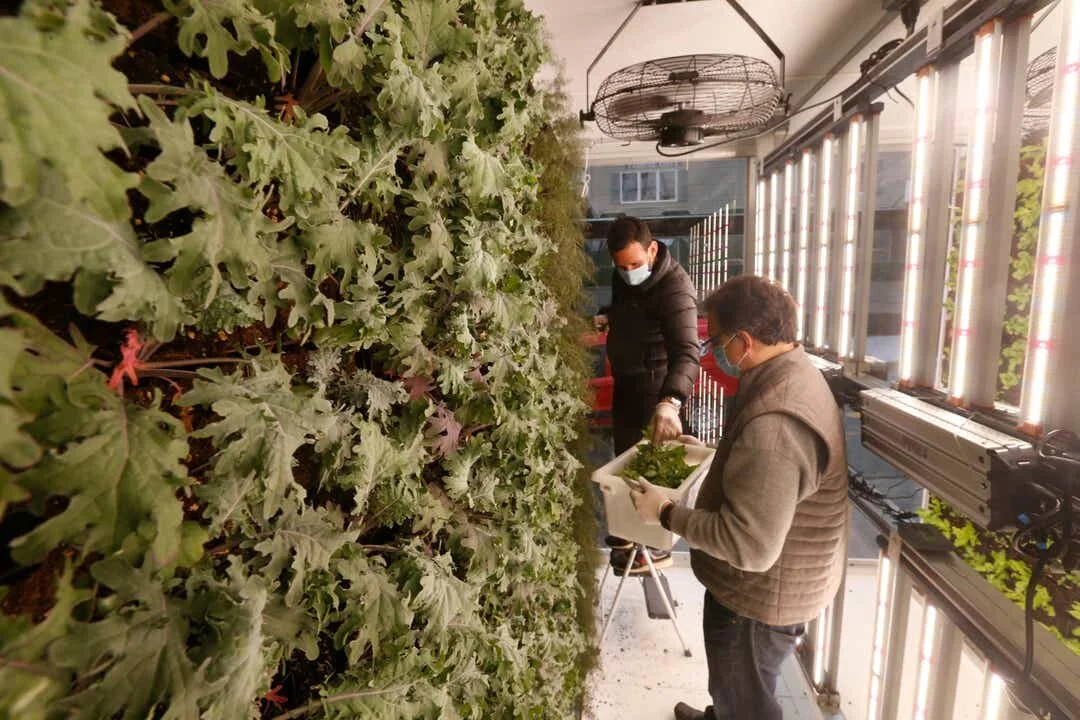Gardening During Coronavirus: How Going Vertical Can Save Space, Move Plants Indoors
Heather Clark Poughkeepsie Journal
May 2, 2020
During the coronavirus pandemic, in which much of the country is sheltering in place, gardening is growing in popularity as a hobby, not to mention a reliable resource for fresh produce.
For many, growing vegetables and herbs has provided peace of mind and relieves the anxiety around such questions as "where does this come from?" or "who's touched this?"
But one big question for some remains: What do you do if you don't have the space to make an in-the-ground-garden?
That's where vertical gardens come in.
Vertical gardens bring the plants off the ground. They are available in a variety of shapes, sizes and methods. Some use soil, others only water and air.
From left, Vertical Field U.S. launch manager Sam Miner and Chef John Lekic, owner of Farmers and Chefs restaurant, food trucks and catering harvest their first batch of herbs and vegetables on April 29, 2020.
Patrick Oehler/Poughkeepsie Journal
Bellefield hires head of agriculture, plans to reduce waste, optimize agricultural space
Dutchess restaurants fight to remain open as losses mount
Orchards in Hudson Valley optimistic for sweet 2020 crop
Fresh, green from the soil
Vertical Field, an international company based in Israel, produces soil-based farms that have their own light source. According to Sam Miner, Vertical Field U.S Launch Manager, the system is designed so its operators can pick and choose what plants go into the garden depending on the menu.
"Essentially within 30 days, someone can have planted plants and be preparing for harvest," Miner said. "The idea is that grocery stores, hotels, restaurants, chefs, nursing homes, and even communities can have these and can become self-sustainable."
In Poughkeepsie, John Lekic, chef and owner of Farmers and Chefs restaurant, recently had a Vertical Field system installed for his restaurant.
"Visually, it's amazing," said Lekic, who also does catering and has food trucks. "I'm really looking forward to the day we can really reopen and customers can experience it."
At Farmers and Chefs, Lekic has grown lettuce, baby kale, brown fennel, basil on the Vertical Field system — and that's just half of their container. Lekic said having the ability to take the vegetable from the farm directly to the customer is a very wholesome experience.
Vegetables grow in the indoor vertical garden at Farmers and Chefs restaurant in the City of Poughkeepsie on April 29, 2020. Patrick Oehler/Poughkeepsie Journal
"I've always been inspired by local farms, and for a chef to be able to grow from the seed then serve on a plate, it really completes the circle," Lekic said. "The technology is a great example of how we can and need to be sustainable."
And the vegetables aren't just used for salads and sides, but dessert too, as Lekic hopes to infuse the ingredients found in their Vertical Field to be used in their vegetable-based ice creams.
Evergreen, a kosher supermarket in Monsey, has installed its first Vertical Field system to ensure customers can see where the vegetables are coming from.
"The fact that customers are always worried about shelf life, they don't know how long it took for the produce to get from the farm to shelf and with this, there's a piece of mind that it's fresh," said Menachem Lubinsky, marketing consultant for Evergreen.
Vegetables grow in the indoor vertical garden at Farmers and Chefs restaurant in the City of Poughkeepsie on April 29, 2020. Patrick Oehler/Poughkeepsie Journal
"This is kind of a resolution, I see it as going beyond the supermarket. There is also a beneficial factor that the taste seems to be better, purer."
Lubinsky also believes the Vertical Field in their stores will give customers a learning experience as they can see how their produce is grown and watch the process.
No soil, just water, and air
Chris Ann Sepkowski of Mamaroneck swears by Tower Garden, a vertical indoor and outdoor aeroponic system that allows you to grow your own produce without the learning curve or time commitment of a traditional garden. There’s no soil; instead, it runs on air and water and takes up just 3 feet of space.
"Especially during this time of the pandemic, it's really a blessing to have it," Sepkowski said. "It provides food security since we can't get out to the store and everyone's a little scared to go — meanwhile here we are picking off of the tower garden. There's nothing like growing your own."
She grows everything on it: lettuce, strawberries, bok choy, spinach, kale, edible flowers, Swiss chard, a variety of herbs, celery, broccoli, Brussels sprouts, squash, eggplant, edamame, green beans, pretty much any veggie that isn't a root.
"People have put (the Tower Garden) on their terraces or even their rooftops in New York City because they don't have access to a backyard," Sepkowski said. "The home model is only 3 feet; it's as simple as removing an end table."
Sepkowski also says it's encouraged healthier eating among her children, who will snack on the variety of vegetables growing.
Elmer Oliveros, co-owner of Brothers Fish and Chips in Ossining, has been using the Tower Garden for a little over a year in the restaurant. He's grown edible flowers used for garnishing as well as lettuce served in the restaurant's salads.
"You know what you put in and where it's coming from. There's more connection, it's very personal. It's right here, I don't need to go anywhere," Oliveros said. "When people come in, there is this aroma from the Tower Garden, it's very pleasant and I really love that. Just the look of having greens right there, during winter especially, it's very rewarding."
Oliveros' word of advice for vertical garden growers is to not let anything overgrow, to keep trimming the plants, and to get rid of the plants that don't quite make it.
Heather Clark: hclark@lohud.com
Published 2:59 PM EDT May 2, 2020


